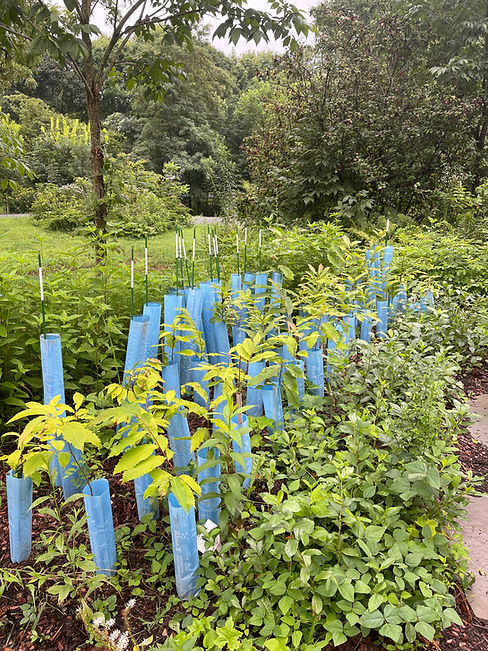
Our Partners
Network Directory Map
Our network is dedicated to building and strengthening trusted, reciprocal relationships among all those involved in the seed and plant material production and use cycle, including farmers, land managers, government agencies, Tribal Nations, educational institutions, non-profits, botanic gardens, private companies, and citizen groups. Explore the Ecotype Project's Network Map to see overlays of key players in the seed supply chain across your ecoregion. With nearly 80 members represented, you can discover who’s working on critical steps in your area. If you’d like to be listed, complete our Network Intake Survey or update your current listing with a photo or species list. We aim to update the map quarterly to keep it as current as possible.
Our Mission
Foster connection and knowledge sharing among those working to improve access to diverse source-identified seeds and plants in the United States (U.S.) Northeastern and Mid-Atlantic States and Atlantic Canada.
Our Vision
A future in which a robust seed and plant supply chain formed through collaboration, coordination, and resource sharing supports resilient and healthy landscapes.

Mission and Vision

Our Values
What drives our work
Collaborate and Complement
As a network of diverse members and partners, we are committed to building collaborative relationships that strengthen and complement one another’s efforts, fostering mutual support and shared impact.
Uncompromising Transparency
Our success lies in honesty and openness. We welcome feedback, make informed decisions together, and strive to remain accountable to one another and the ecosystems we serve.
Continuous Improvement
We embrace humility and curiosity, consistently seeking opportunities to learn and adapt. Our commitment is to continually elevate the quality, relevance, and impact of our collective work.
Our collective journey
Building a regional alliance
Producing native seeds and plant materials at scale in the Northeast poses unique challenges, including higher production costs and smaller landholdings. Despite these obstacles, many dedicated organizations have been working to cultivate native seed and plant supplies to meet the growing demand for ecological restoration in the Northeast and Northern Mid-Atlantic states. However, building a resilient, region-wide supply chain requires collaboration beyond what any one organization can achieve alone. In response, a collective of regional stakeholders came together in March 2023 to form the Northeast Seed Network. Coordinated by the Ecological Health Network, this alliance of regional seed partnerships focuses on fostering communication, sharing knowledge, and creating communities of practice to enhance the accessibility of diverse, source-identified native seeds and plant materials for ecological restoration, ecological landscaping, and regenerative agriculture efforts across the region.

Our Story

The need for seed
Supply chain bottlenecks
Our region is turning to ecological restoration and allied activities to prepare for climate change, mitigate ecosystem degradation, generate just livelihood options, advance equity, and improve human health and well-being. The rapid growth in the number and scale of reforestation, coastline rehabilitation, urban street tree planting and forestry, agroforestry and regenerative agriculture, pollinator pathway creation, and blue-green flood water infrastructure activities is driving a surge in demand for native seeds and plant material. However, chronic commercial shortages of genetically appropriate, viable seeds and plant material of known provenance for the range of plant species native to the region present a formidable bottleneck to meeting restoration goals now and in the future.
Healthy ecosystems,
healthy people
The United Nations declared 2021–2030 as the Decade on Ecosystem Restoration, calling for global cooperation to accelerate the recovery of degraded ecosystems. In our region, unsustainable land use and settlement patterns have heightened communities’ vulnerability to sea-level rise, coastal storms, and extreme weather events. Restoration efforts—from basic remediation to full ecosystem recovery—are critical for building resilience. Restored wetlands purify water and reduce flooding, while natural coastal buffers like dunes and marshes protect infrastructure by absorbing wave energy. In cities, revitalized urban forests, parks, and gardens help cool neighborhoods, improving health during extreme heat. In agriculture, planting diverse crops, cover crops, and multi-purpose hedges restores soil health, enabling farmers to adapt to changing weather while boosting income through ecosystem services. Healthy ecosystems are essential for providing critical social, environmental, and economic benefits to society.

